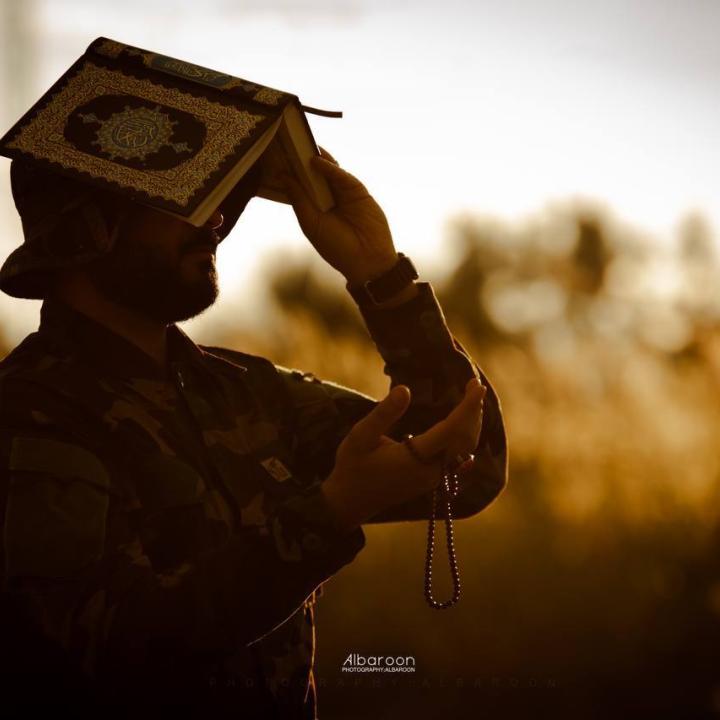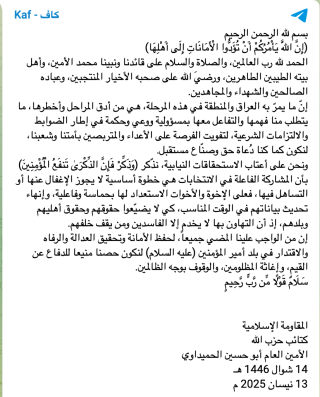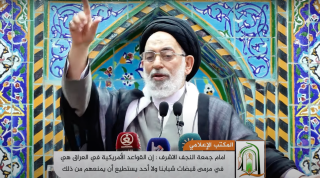
Kataib Hezbollah Chief Urges Ongoing Caution with the United States

Abu Hussein has asked the group's fighters to keep showing restraint, seemingly reinforcing Iran's preference for calm as nuclear talks with Washington proceed.
On April 13, the secretary-general of Kataib Hezbollah (KH), Ahmad Mohsen Faraj al-Hamidawi (aka Abu Hussein), issued a statement calling on militia members to (1) exercise military restraint and (2) focus on Iraq's upcoming election (Figure 1). The English translation of the statement's substantive portion reads as follows:
"What Iraq and the region are going through at this moment is one of the most delicate and dangerous phases, requiring us to understand it and engage with it responsibly, consciously, and wisely within the framework of controls and [Islamic] legal obligations. This approach will thwart the opportunity for enemies and those who lie in wait for our nation and people, so that we may continue to be, as we have been, advocates of truth and makers of the future.
"As we approach the parliamentary election, we remind you that active participation in the elections is an essential step that should not be overlooked or neglected [Note: this sentence quotes from the Dhariyat surah of the Quran: “And remind, for indeed, the reminder benefits the believers”]. Our brothers and sisters should prepare for them with enthusiasm and effectiveness, and should update their information in a timely manner, so as not to squander their rights and the rights of their families and their country, as negligence in this regard only serves the corrupt and those who stand behind them.
"It is our duty to all work together to preserve trust and achieve justice, prosperity, and power in the country of the Commander of the Faithful (peace be upon him). We must be a strong fortress defending values, aiding the oppressed, and standing up to oppressors."
This is not the first time Abu Hussein has used a public statement to enforce militia restraint at a sensitive juncture. In January 2024, he issued a statement suspending military operations following a drone strike in Jordan that killed three Americans and wounded many more. At the time, Militia Spotlight assessed that his goal was to de-escalate and forestall an imminent U.S. military operation while supporting Iranian information operations.
This latest statement is likely an attempt to achieve three objectives. First, Abu Hussein and KH are probably following directions issued by Iran's Islamic Revolutionary Guard Corps-Qods Force (IRGC-QF) to avoid escalation or miscalculation—hence the stated need to operate within a “framework of Islamic controls and obligations.” This need is driven by current sensitivities relating to Tehran's nuclear negotiations with the Trump administration, as well as wider regional tensions. Notably, other Iran-backed Iraqi militias also appear to be aligning with this restrained stance. For example, Harakat Hezbollah al-Nujaba and Kataib Sayyid al-Shuhada—both known for frequent aggressive statements—have moderated their rhetoric in recent weeks.
Second, Abu Hussein likely seeks to reassure grassroots members of KH and the wider "axis of resistance" who are frustrated by the recent setbacks that Iran and its proxies have suffered around the Middle East. These members will likely become restive without effective guidance and could launch unsanctioned, counterproductive attacks on Israel or U.S. forces if they feel their leaders are failing to act. By framing the current moment as a critical juncture requiring restraint, Abu Hussein is justifying the ongoing tactical pause while reaffirming the group’s long-term vision and “resistance” credentials.
Third, Abu Hussein reveals the most important effort for the "resistance": securing strong results in November’s parliamentary election. Maintaining control of the legislature and, by extension, influence over the executive branch is vitally importance for Iran and its militia partners. A loss of political sway would jeopardize a range of economic, political, and military benefits accrued under the current parliament. Accordingly, the statement mentions concrete steps related to voter registration—a telling contrast to its more general statements about the need for restraint, suggesting the importance KH leaders are placing on the election.
The Pause on Attacks Continues...for Now
Abu Hussein’s statement indicates that KH and, likely, other major "resistance" factions will continue restraining themselves militarily so long as Iran is negotiating with the United States. Yet some actors have signaled that this posture is conditional. Sadr al-Din al-Qubbanji—a leading member of the Islamic Supreme Council of Iraq and the Friday prayer leader in Najaf—recently warned that Iraqi militias will target U.S. assets in Iraq if Iran is attacked. In a April 4 sermon, he claimed, “The five publicly known American bases in Iraq...are within range of Iranian artillery...The very second Iran is struck...you’ll see these go up in flames...In fact, they’re within range of our own youths' [meaning militia] artillery. Do you think our youths will stay silent? Our youths won’t stay silent, and no one can stand in their way” (Figure 2).






